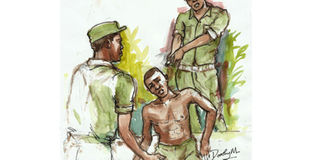Trials of medics in the army

Medics in the army have in the past been forced to put the very life they are meant to protect, in danger.
What you need to know:
Conflict. Doctors are known to save lives. However, medics in the army have in the past been forced to put the very life they are meant to protect, in danger.
In 1979 the South African Medical services was formed as part of the South African National Defence Force. It was responsible for providing health services to the army, navy and air force, including health services in the former homelands and parts of Namibia and Angola.
The medical personnel offering these services included doctors, nurses, psychologists, and non-professional, military trained ‘medics’. These medical personnel were fully incorporated into the doctrine and standing operational procedures of the combat forces.
Sean Collaghan was one such youth who chose to serve as a medic in the army and his reason for doing so was so that he could “help people rather than kill them”.
An issue of race
Collaghan found himself working in the townships and on the Namibian and Angolan border. He was in for a rude shock. He noted that the first time many of the medics performed any medical procedures was in black hospitals.
He stated “frankly it did not matter if we made a mistake because they were black people and the only way to cope with the situation was to switch off my emotions immediately, ...and do what I was trained to do.”
Treating torture victims
Members of the armed forces were given money as incentives to carry out military objectives such as killing and recovering weapons from the enemy.
There was a case in which an officer became so frustrated with a patient from whom he failed to find a firearm and then shot the patient through the head while Collaghan was cleaning the patient’s wounds.
Torture was used in the army during interrogations to extract information about the enemy and especially the whereabouts of arms caches.
Some of the procedures included electric shock around the genitals and pouring boiling water over the chest and genitals. Medics were expected to treat the resultant injuries.
No help for mental illness
There was virtually no psychological help for these medics to deal with the tragedies that they witnessed. They often drunk heavily or took drugs, one of the ways to cope with these adverse circumstances. Suicides were common among the medics.
When Collaghan did go to the local psychiatrist for help, he was told to “go up and carry on” because there was nothing wrong with him. And once the men completed their military service, there was no debriefing or assistance to them reintegrate into society.
After completing his military service, Collaghan suffered from post-traumatic stress disorder for ten years. It was therefore apparent that military medics were forced to violate international and local standards of professional conduct and human rights and that many were traumatised by their experiences.
Threats
A young doctor serving in the army was treated with hostility and suspicion by his commandant right from the time of his posting. He was later to learn that the other doctors had been handpicked and was warned that if he ever breathed a word of anything he had seen or caused any trouble, he would disappear without a trace.
The most challenging cases were perhaps of the health professions employed in the development of and research into weapons for use in biological and chemical warfare. Dr Wouter Basson, a medical doctor, was in-charge of the research project on chemical warfare.
Allegations
Some of the allegations about the use of biological and chemical weapons included; the use of a paralysing gas in May 1978 in the massacre at Kassinga, Angola; the use of napalm and defoliants in the Rustenburg area in August 1978 in an attempt to flush out a detachment of freedom fighters; an attack on FRELIMO troops near the South Africa border on January 16, 1992 using a gas similar to teargas that was sprayed from reconnaissance planes.
The army also used doctors to develop weapons such as letter bombs and silencers for guns. One medic admitted working for a company that developed weapons such as letter bombs and special weapons that could deliver small amounts of lethal chemicals. Several medical doctors involved in this project were named.
OBSERVATIONS
The young doctor observed a few
• The commandant and his deputy changing patients’ prescriptions and discharging patients without consulting the doctors
• The commandant’s refusal to supply the necessary medication to a patient
• Disregard of his recommendations for treatment of a patient who had injuries that were thought to have been inflicted by security police. The patient subsequently disappeared.




